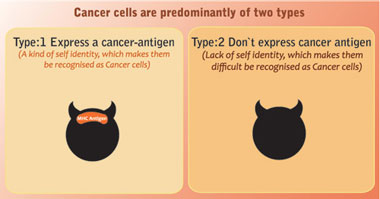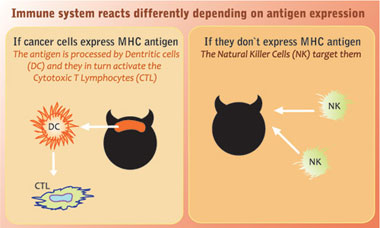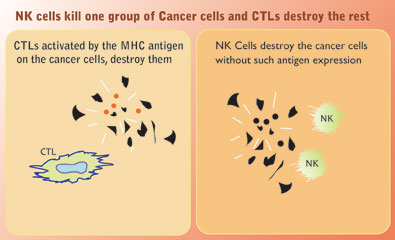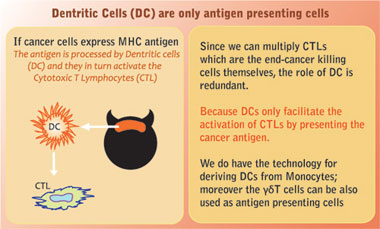Sample menu:

The immune surveillance system in human beings has natural and acquired components. The Natural Killer Cells (NK) and Dendritic cells belong to the natural component and the acquired component has humoral immunity with antibodies and cell mediated immunity with cytotoxic T-lymphocytes (CTLs). These immune surveillance mechanisms are responsible for tackling cancer cells as well as viral infected cells by mounting appropriate defense mechanisms. An initial response to viral infection primarily involves the innate arm of immunity and the killing of infected cells with cytotoxic lymphocytes such as natural killer (NK) cells. Once the virus invades the cell, a second host defense-mediated response is triggered by interferons (IFNs). The IFNs, function by stimulating the adaptive arm of immunity involving cytotoxic T cells (CTLs) which facilitates apoptosis
Natural Killer cell is an important component of the innate immune system and plays a central role in
host defense against tumor and virus infected cells. NK cells release perforin, which punches large holes through the cancer cell membrane and then injects large quantities of granzyme, which degrade the DNA and other cellular components through these holes, leading to death of the cancer cell. A single NK cell can destroy up to 27 cancer cells before it dies.
They are termed as "natural killers" because they do not require activation in order to kill cells that are missing or not expressing the "self" markers of major histocompatibility complex (MHC) class I.
CTLSs are Cytotoxic T Lymphocytes also known as TC, CTL, T-Killer cell, cytolytic T cell, CD8+ T-cells or killer T cell. They kill cells infected with Virus or dysfunctional cells like the cancer cells. The CTLs express T cell receptors that can recognize a specific protein molecule bound to Class I MHC molecules present on all nucleated cells.
missing or not expressing the "self" markers of major histocompatibility complex (MHC) class I.
CTLSs are Cytotoxic T Lymphocytes also known as TC, CTL, T-Killer cell, cytolytic T cell, CD8+ T-cells or killer T cell. They kill cells infected with Virus or dysfunctional cells like the cancer cells. The CTLs express T cell receptors that can recognize a specific protein molecule bound to Class I MHC molecules present on all nucleated cells.
Thus CTLs are antigen specific. When the host cells are infected with a virus or become mutated turning to a cancer cell ,the cells degrade the foreign proteins and the peptide fragments are presented by MHC Class I to the T cells which gets activated and goes on a rampage killing all the cells that express the foreign antigen in the whole body
Dendritic Cell (DC) vaccines are quite a popular form of Immunotherapy in which the dendritic cells present the tumour antigens to the body's Cytotoxic T lymphocytes for destruction of the tumour cells. However, only limited clinical responses have been observed in cancer patients treated with DC based vaccines. The recent updates on DC based Vaccines have painted a gloomy picture, which is due to the T irreversible blockade of DC maturation in a non-functional stage due to tumor-induced immunosuppression or tolerance (Cathelin et al, 2007). AIET however has an added advantage over Dendritic Cell vaccine because in this the Cytotoxic T Lymphocytes from the patient themselves are directly activated, expanded in the lab and when reinfused back to the patient they can effectively act against the tumour cells
 The unique feature of AIET is that this therapy involves infusion of activated NK cells and CTLs/ATLs* which can target both type of cancer cells, those that express the MHC class I molecules and those that do not. Cells which express MHC class I are destroyed by the CTLs while those that do not are killed by the NK cells thus bringing an efficient destruction of the cancer cells
The unique feature of AIET is that this therapy involves infusion of activated NK cells and CTLs/ATLs* which can target both type of cancer cells, those that express the MHC class I molecules and those that do not. Cells which express MHC class I are destroyed by the CTLs while those that do not are killed by the NK cells thus bringing an efficient destruction of the cancer cells
The recent shot-in-the–arm for AIET is the finding that the Cancer stem cells are preferentially killed by NK cells (Tseng et al, 2010, Castriconi et al, 2009) and the T cells (Weng et al, 2010, Ahmed et al, 2010). With these evidences it is appropriate to say that AIET apart from destroying the tumour would benefit the patient by destroying the circulating cancer stem cells also thereby preventing metastases and recurrence.
Recently we have started working on Gamma Delta T Cells to augment the antigen presentation further enhancing the potentials of AIET in the fight against cancer
* The process of cell expansion / activation done in Vitro for the AIET involves multiplication and activation of NK Cells and Cytotoxic T Lymphocytes (CTLs) / Activated T Lymphocytes (ATLs)





